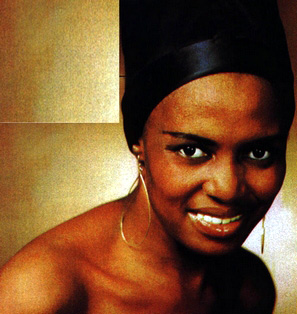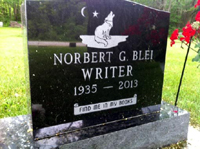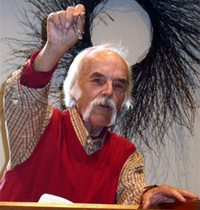
Poetry Dispatch No. 259 | November 29, 2008
Pastoral
by William Carlos Williams
When I was younger
it was plain to me
I must make something of myself.
Older now
I walk back streets
admiring the houses
of the very poor:
roof out of line with sides
the yards cluttered
with old chicken wire, ashes,
furniture gone wrong;
the fences and outhouses
built of barrel staves
and parts of boxes, all,
if I am fortunate,
smeared a bluish green
that properly weathered
pleases me best of all colors.
No one
will believe this
of vast import to the nation.
from The Collected Poems of W.C. Williams, New Directions
![]()

William Carlos Williams (September 17, 1883 – March 4, 1963), was an American poet closely associated with modernism and Imagism. He was also a pediatrician and general practitioner of medicine. Williams “worked harder at being a writer than he did at being a physician,” wrote biographer Linda Wagner-Martin. During his long lifetime, Williams excelled both as a poet and a physician.
Williams was born in Rutherford, New Jersey, a community near the city of Paterson. His father was an English immigrant, and his mother was born in San Juan, Puerto Rico. He attended public school in Rutherford until 1896, then was sent to study at Château de Lancy near Geneva, Switzerland, the Lycée Condorcet in Paris, France, for two years and Horace Mann School in New York City. Then, in 1902, he entered the University of Pennsylvania Medical School. During his time at Penn, Williams became friends with Ezra Pound, Hilda Doolittle (best known as H.D.) and the painter Charles Demuth. These friendships influenced his growth and passion for poetry. He received his M.D. in 1906 and spent the next four years in internships in New York City and in travel and postgraduate studies abroad (e.g., at the University of Leipzig where he studied pediatrics). He returned to Rutherford in 1910 and began his medical practice, which lasted until 1951. Most of his patients knew little if anything of his writings; instead they viewed him as a doctor who helped deliver their children into the world. It was estimated that Williams delivered 2,000 babies in the Rutherford area between 1910 and 1952. Today, Rutherford is home to a theater, “The Williams Center,” named after the poet.
Williams married Florence Herman (1891-1976) in 1912. They moved into a house in Rutherford which was their home for many years. Shortly afterwards, his first book of serious poems, The Tempers, was published. On a trip to Europe in 1924, Williams spent time with writers Ezra Pound and James Joyce. Flossie and Williams’s sons stayed behind in Europe to experience living abroad for a year as Williams and his brother had in their youth.
Although his primary occupation was as a doctor, Williams had a full literary career. His work consists of short stories, poems, plays, novels, critical essays, an autobiography, translations and correspondence. He wrote at night and spent weekends in New York City with friends – writers and artists like the avant-garde painters Marcel Duchamp and Francis Picabia and the poets Wallace Stevens and Marianne Moore. He became involved in the Imagist movement but soon he began to develop opinions that differed from those of his poetic peers, Ezra Pound and T. S. Eliot. Later in his life, Williams toured the United States giving poetry readings and lectures.
Modern liberals portray Williams as aligned with liberal democratic issues; however, as his publications in more politically radical journals like Blast and New Masses suggest, his political commitments were further to the left than the term “liberal” indicates. He considered himself a socialist and opponent of capitalism, and in 1935 published “The Yachts”, a poem which indicts the rich elite as parasites and the masses as striving for revolution. The poem features an image of the ocean as the “watery bodies” of the poor masses beating at their hulls “in agony, in despair”, attempting to sink the yachts and end “the horror of the race”. Furthermore, in the introduction to his 1944 book of poems ,“The Wedge” he writes of socialism as an inevitable future development and as a necessity for true art to develop. In 1949, he published a booklet/bar “The Pink Church” that was about the human body but was understood, in the context of McCarthyism, as being dangerously pro-communist. The anti-communist movement led to his losing a consultantship with the Library of Congress in 1952/3, an event that contributed to his being treated for clinical depression. As is demonstrated in an unpublished article for Blast, Williams believed artists should resist producing propaganda and be “devoted to writing (first and last).” However, in the same article Williams claims that art can also be “in the service of the proletariat”.
After Williams suffered a heart attack in 1948, his health began to decline, and after 1949 a series of strokes followed. He also underwent treatment for clinical depression in a psychiatric hospital during 1953. Williams died on March 4, 1963 at the age of seventy-nine at his home in Rutherford, New Jersey. Two days later, a British publisher finally announced that he was going to print his poems – one of fate’s ironies, since Williams had always protested against the English influence on American poetry. During his lifetime, he had not received as much recognition from Britain as he had from the United States. He was buried in Hillside Cemetery in Lyndhurst, New Jersey.
During the First World War, when a number of European artists established themselves in New York City, Williams became friends with members of the avant-garde such as Man Ray, Francis Picabia and Marcel Duchamp. In 1915 Williams began to be associated with a group of New York artists and writers known as “The Others.” Founded by the poet Alfred Kreymborg and by Man Ray, this group included Walter Conrad Arensberg, Wallace Stevens, Mina Loy, Marianne Moore and Duchamp. Through these involvements Williams got to know the Dadaist movement, which may explain the influence on his earlier poems of Dadaist and Surrealist principles. His involvement with The Others made Williams a key member of the early modernist movement in America.
 Williams disliked Ezra Pound’s and especially T. S. Eliot’s frequent use of allusions to foreign languages and Classical sources, as in Eliot’s The Waste Land. Williams preferred to draw his themes from what he called “the local.” In his modernist epic collage of place, Paterson (published between 1946 and 1958), an account of the history, people, and essence of Paterson, New Jersey, he examined the role of the poet in American society. Williams most famously summarized his poetic method in the phrase “No ideas but in things” (found in his 1927 poem “Patterson,” the forerunner to the book-length work). He advocated that poets leave aside traditional poetic forms and unnecessary literary allusions, and try to see the world as it is. Marianne Moore, another skeptic of traditional poetic forms, wrote Williams had used “plain American which cats and dogs can read,” with distinctly American idioms.
Williams disliked Ezra Pound’s and especially T. S. Eliot’s frequent use of allusions to foreign languages and Classical sources, as in Eliot’s The Waste Land. Williams preferred to draw his themes from what he called “the local.” In his modernist epic collage of place, Paterson (published between 1946 and 1958), an account of the history, people, and essence of Paterson, New Jersey, he examined the role of the poet in American society. Williams most famously summarized his poetic method in the phrase “No ideas but in things” (found in his 1927 poem “Patterson,” the forerunner to the book-length work). He advocated that poets leave aside traditional poetic forms and unnecessary literary allusions, and try to see the world as it is. Marianne Moore, another skeptic of traditional poetic forms, wrote Williams had used “plain American which cats and dogs can read,” with distinctly American idioms.
One of his most notable contributions to American literature was his willingness to be a mentor for younger poets. Though Pound and Eliot may have been more lauded in their time, a number of important poets in the generations that followed were either personally tutored by Williams or pointed to Williams as a major influence. He had an especially significant influence on many of the American literary movements of the 1950s: poets of the Beat Generation, the San Francisco Renaissance, the Black Mountain school, and the New York School. He personally mentored Charles Olson, who was instrumental in developing the poetry of the Black Mountain College and subsequently influenced many other poets. Robert Creeley and Denise Levertov, two other poets associated with Black Mountain, studied under Williams. Williams was friends with Kenneth Rexroth, the founder of the San Francisco Renaissance. A lecture Williams gave at Reed College was formative in inspiring three other important members of that Renaissance: Gary Snyder, Philip Whalen and Lew Welch. One of Williams’s most dynamic relationships as a mentor was with fellow New Jerseyite Allen Ginsberg. Ginsberg claimed that Williams essentially freed his poetic voice. Williams included several of Ginsberg’s letters in Paterson, stating that one of them helped inspire the fifth section of that work. Williams also wrote introductions to two of Ginsberg’s books, including Howl. Williams sponsored unknown poets such as H.H. Lewis, a radical Missouri Communist poet, who he believed wrote in the voice of the people. Though Williams consistently loved the poetry of those he mentored, he did not always like the results of his influence on other poets (the perceived formlessness, for example, of other Beat Generation poets). Williams believed more in the interplay of form and expression.
In May 1963 he was posthumously awarded the Pulitzer Prize for Pictures from Brueghel and Other Poems (1962) and the Gold Medal for Poetry of the National Institute of Arts and Letters. His major works are Kora in Hell (1920), Spring and All (1923), Pictures from Brueghel and Other Poems (1962), Paterson (1963, repr. 1992), and Imaginations (1970). The Poetry Society of America continues to honor William Carlos Williams by presenting an annual award in his name for the best book of poetry published by a small, non-profit or university press.

Williams’ most anthologized poem is “The Red Wheelbarrow”, considered an example of the Imagist movement’s style and principles (see also “This Is Just To Say”). However, Williams, like his associate Ezra Pound, had long ago rejected the imagist movement by the time this poem was published as part of Spring and All in 1923. Williams is more strongly associated with the American Modernist movement in literature, and saw his poetic project as a distinctly American one; he sought to renew language through the fresh, raw idiom that grew out of America’s cultural and social heterogeneity, at the same time freeing it from what he saw as the worn-out language of British and European culture.
Williams tried to invent an entirely fresh form, an American form of poetry whose subject matter was centered on everyday circumstances of life and the lives of common people. He then came up with the concept of the variable foot evolved from years of visual and auditory sampling of his world from the first person perspective as a part of the day in the life as a physician. The variable foot is rooted within the multi-faceted American Idiom. This discovery was a part of his keen observation of how radio and newspaper influenced how people communicated and represents the “machine made out of words” (as he described a poem in the introduction to his book, The Wedge) just as the mechanistic motions of a city can become a consciousness. Williams didn’t use traditional meter in most of his poems. His correspondence with Hilda Doolittle also exposed him to the relationship of sapphic rhythms to the inner voice of poetic truth:
“The stars about the beautiful moon again hide their radiant shapes, when she is full and shines at her brightest on all the earth”—Sappho.
This is to be contrasted with a poem from Pictures from Brueghel titled “Shadows”:
“Shadows cast by the street light
under the stars,
the head is tilted back,
the long shadow of the legs
presumes a world taken for granted
on which the cricket trills”
The breaks in the poem search out a natural pause spoken in the American idiom that is also reflective of rhythms found within jazz sounds that also touch upon Sapphic harmony. Williams experimented with different types of lines and eventually found the “stepped triadic line”, a long line which is divided into three segments. This line is used in Paterson and in poems like “To Elsie” and “The Ivy Crown.” Here again one of Williams’ aims is to show the truly American (i.e., opposed to European traditions) rhythm which is unnoticed but present in everyday American language. Stylistically, Williams worked with variations on free-form styles, notably developing and utilising the triadic line as in his lengthy love-poem Asphodel, That Greeny Flower

Bibliography
Poetry
- * Poems (1909)
- * The Tempers (1913)
- * Al Que Quiere (1917)
- * Kora in Hell. Improvisations (1920, repr. 1973)
- * Sour Grapes (1921)
- * Spring and All (1923)
- * Go Go (1923)
- * The Cod Head (1932)
- * Collected Poems, 1921-1931 (1934)
- * An Early Martyr and Other Poems (1935)
- * Adam & Eve & The City (1936)
- * The Complete Collected Poems of William Carlos Williams, 1906-1938 (1938)
- * The Broken Span (1941)
- * The Wedge (1944)
- * Paterson (Book I, (1946; Book II, (1948; Book III, 1949; Book IV, (1951; Book V, (1958)
- * Clouds, Aigeltinger, Russia (1948)
- * The Collected Later Poems (1950; rev. ed.1963)
- * Collected Earlier Poems (1951; rev. ed., 1966)
- * The Desert Music and Other Poems (1954)
- * Journey to Love (1955)
- * Pictures from Brueghel and Other Poems (1962)
- * Paterson (Books I-V in one volume, (1963)
- * Imaginations (1970)
- * Collected Poems: Volume 1, 1909-1939 (1988)
- * Collected Poems: Volume 2, 1939-1962 (1989)
- * Early Poems (1997)
Prose
- * Kora in Hell (1920) — Prose-poem improvisations.
- * The Great American Novel (1923) — A novel.
- * Spring and All (1923) — A hybrid of prose and verse.
- * In the American Grain (1925, 1967, repr. New Directions 2004) — Prose on historical figures and events.
- * A Voyage to Pagany (1928; repr. 1970) — An autobiographical travelogue in the form of a novel.
- * Novelette and Other Prose (1932)
- * The Knife of the Times, and Other Stories (1932; repr. 1974)
- * White Mule (1937; repr. 1967) — A novel.
- * Life along the Passaic River (1938) — Short stories.
- * In the Money (1940; repr. 1967) — Sequel to White Mule.
- * Make Light of It: Collected Stories (1950)
- * Autobiography (1951; 1967)
- * The Build-Up (1952) — Completes the “Stecher trilogy” begun with White Mule.
- * Selected Essays (1954)
- * The Selected Letters of William Carlos Williams (1957)
- * I Wanted to Write a Poem: The Autobiography of the Works of a Poet (1958)
- * Yes, Mrs. Williams: A Personal Record of My Mother (1959)
- * The Farmers’ Daughters: Collected Stories (1961)
- * Imaginations (1970) — A collection of five previously published early works.
- * The Embodiment of Knowledge (1974) — Philosophical and critical notes and essays.
- * Interviews With William Carlos Williams: “Speaking Straight Ahead” (1976)
- * A Recognizable Image: William Carlos Williams on Art and Artists (1978)
- * Pound/Williams: Selected Letters of Ezra Pound and William Carlos Williams (1996)
- * The Collected Stories of William Carlos Williams (1996)
- * The Letters of Denise Levertov and William Carlos Williams (1998)
- * William Carlos Williams and Charles Tomlinson: A Transatlantic Connection (1998)
Drama
- * Many Loves and Other Plays: The Collected Plays of William Carlos Williams (1961)





 Miriam Makeba (4 March 1932 – 9 November 2008 was a Grammy Award-winning South African singer, also known as Mama Afrika.
Miriam Makeba (4 March 1932 – 9 November 2008 was a Grammy Award-winning South African singer, also known as Mama Afrika.





























































Recent Comments